Research Methods Report: Quantitative and Qualitative Approaches
VerifiedAdded on 2021/01/01
|13
|4001
|359
Report
AI Summary
This report provides a comprehensive overview of research methods, differentiating between quantitative and qualitative approaches. It explores the philosophical underpinnings of each, including positivism and post-positivism for quantitative research, and phenomenology, ethnography, and social constructionism for qualitative research. The report details the arguments in favor of quantitative research, emphasizing its structured nature, focus on numerical data, and ability to establish relationships between variables through statistical analysis. It outlines the steps involved in conducting quantitative research, from defining objectives to presenting results, and highlights various data collection instruments such as structured questionnaires and surveys. Additionally, the report evaluates the application of both research approaches in counselling and psychology, reflecting on how the assignment relates to dissertation focus, particularly in the context of large-scale data analysis. The assignment emphasizes the importance of choosing appropriate research methods to achieve specific research objectives, providing a detailed guide to both quantitative and qualitative research methodologies.

Research Methods
Paraphrase This Document
Need a fresh take? Get an instant paraphrase of this document with our AI Paraphraser
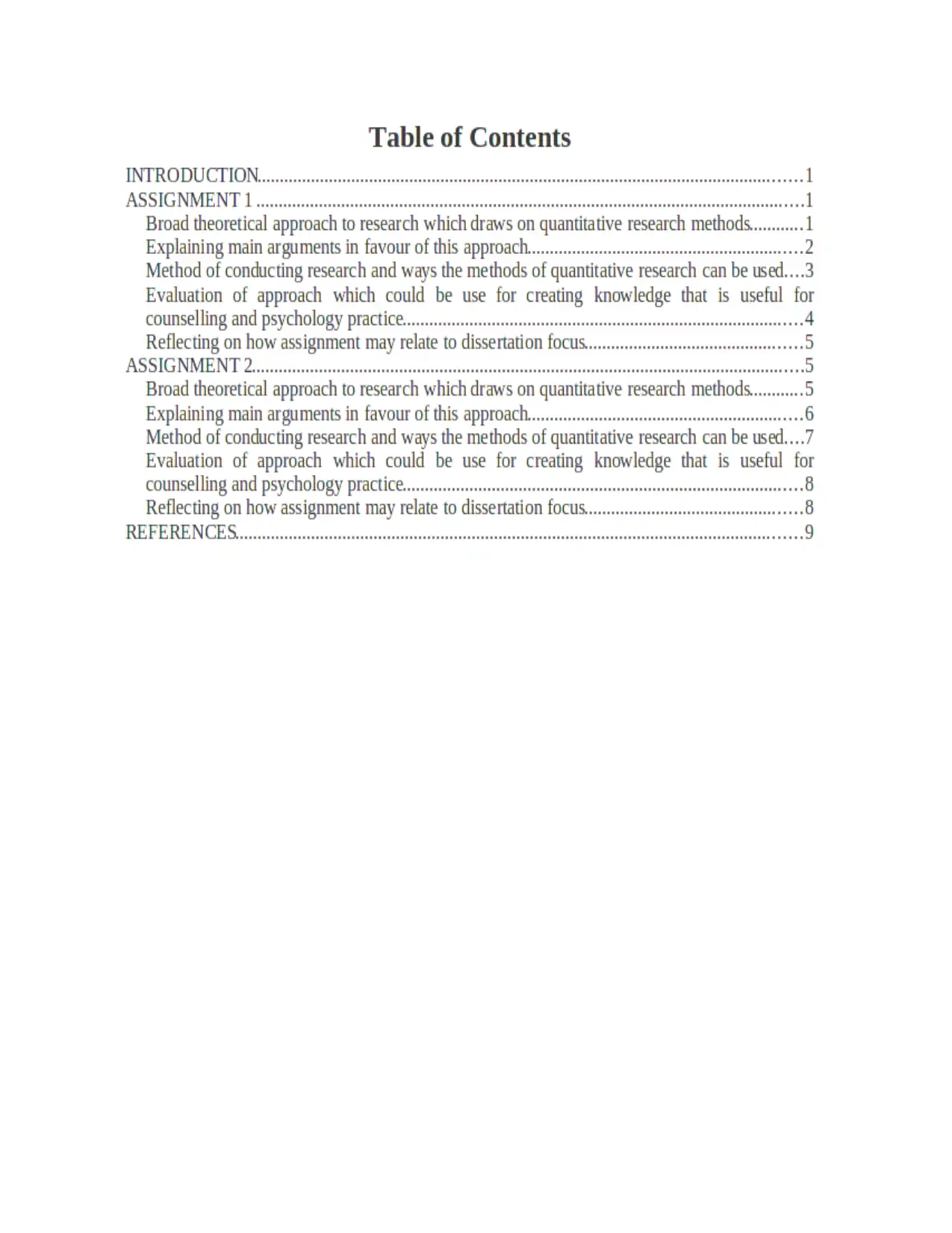
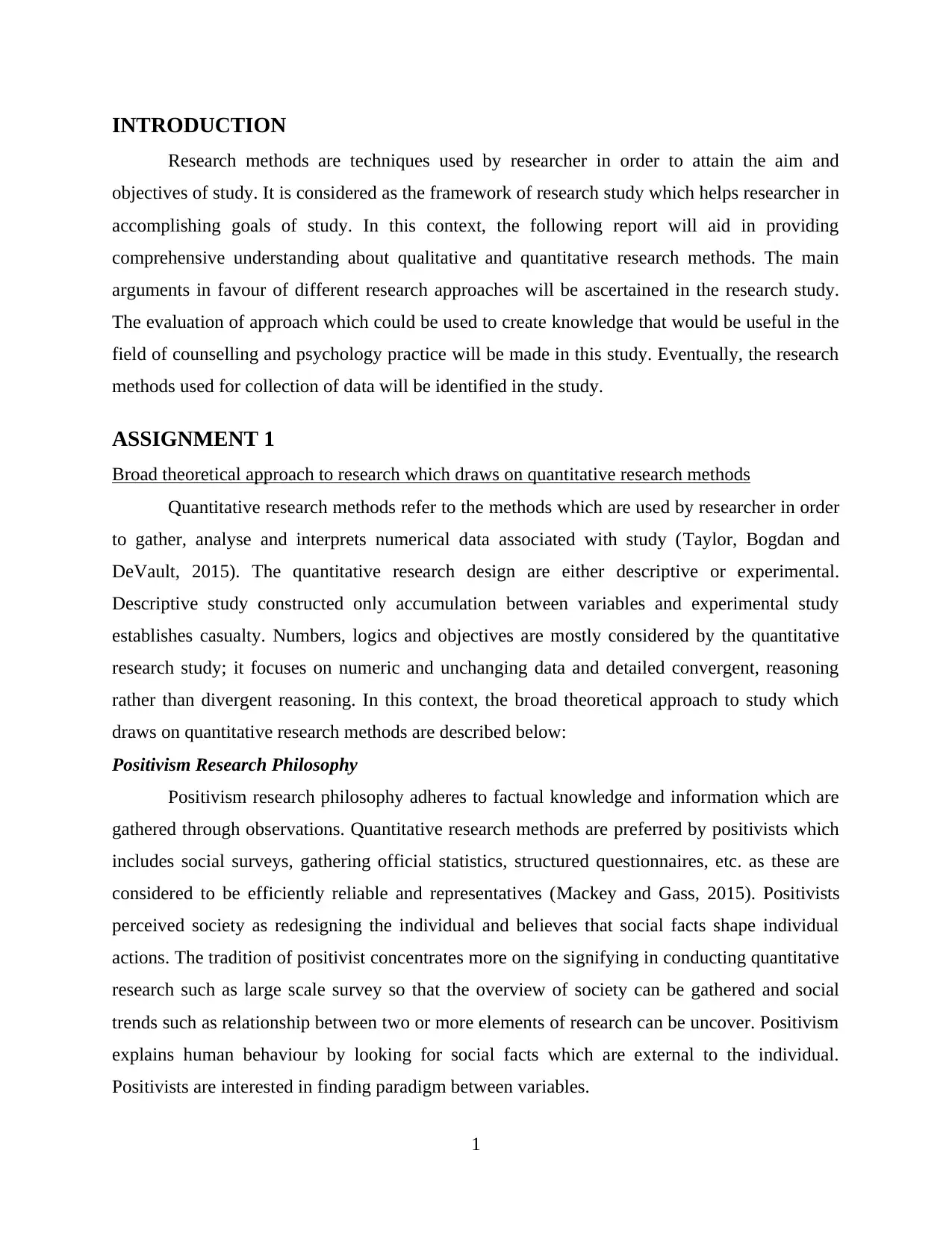
INTRODUCTION
Research methods are techniques used by researcher in order to attain the aim and
objectives of study. It is considered as the framework of research study which helps researcher in
accomplishing goals of study. In this context, the following report will aid in providing
comprehensive understanding about qualitative and quantitative research methods. The main
arguments in favour of different research approaches will be ascertained in the research study.
The evaluation of approach which could be used to create knowledge that would be useful in the
field of counselling and psychology practice will be made in this study. Eventually, the research
methods used for collection of data will be identified in the study.
ASSIGNMENT 1
Broad theoretical approach to research which draws on quantitative research methods
Quantitative research methods refer to the methods which are used by researcher in order
to gather, analyse and interprets numerical data associated with study (Taylor, Bogdan and
DeVault, 2015). The quantitative research design are either descriptive or experimental.
Descriptive study constructed only accumulation between variables and experimental study
establishes casualty. Numbers, logics and objectives are mostly considered by the quantitative
research study; it focuses on numeric and unchanging data and detailed convergent, reasoning
rather than divergent reasoning. In this context, the broad theoretical approach to study which
draws on quantitative research methods are described below:
Positivism Research Philosophy
Positivism research philosophy adheres to factual knowledge and information which are
gathered through observations. Quantitative research methods are preferred by positivists which
includes social surveys, gathering official statistics, structured questionnaires, etc. as these are
considered to be efficiently reliable and representatives (Mackey and Gass, 2015). Positivists
perceived society as redesigning the individual and believes that social facts shape individual
actions. The tradition of positivist concentrates more on the signifying in conducting quantitative
research such as large scale survey so that the overview of society can be gathered and social
trends such as relationship between two or more elements of research can be uncover. Positivism
explains human behaviour by looking for social facts which are external to the individual.
Positivists are interested in finding paradigm between variables.
1
Research methods are techniques used by researcher in order to attain the aim and
objectives of study. It is considered as the framework of research study which helps researcher in
accomplishing goals of study. In this context, the following report will aid in providing
comprehensive understanding about qualitative and quantitative research methods. The main
arguments in favour of different research approaches will be ascertained in the research study.
The evaluation of approach which could be used to create knowledge that would be useful in the
field of counselling and psychology practice will be made in this study. Eventually, the research
methods used for collection of data will be identified in the study.
ASSIGNMENT 1
Broad theoretical approach to research which draws on quantitative research methods
Quantitative research methods refer to the methods which are used by researcher in order
to gather, analyse and interprets numerical data associated with study (Taylor, Bogdan and
DeVault, 2015). The quantitative research design are either descriptive or experimental.
Descriptive study constructed only accumulation between variables and experimental study
establishes casualty. Numbers, logics and objectives are mostly considered by the quantitative
research study; it focuses on numeric and unchanging data and detailed convergent, reasoning
rather than divergent reasoning. In this context, the broad theoretical approach to study which
draws on quantitative research methods are described below:
Positivism Research Philosophy
Positivism research philosophy adheres to factual knowledge and information which are
gathered through observations. Quantitative research methods are preferred by positivists which
includes social surveys, gathering official statistics, structured questionnaires, etc. as these are
considered to be efficiently reliable and representatives (Mackey and Gass, 2015). Positivists
perceived society as redesigning the individual and believes that social facts shape individual
actions. The tradition of positivist concentrates more on the signifying in conducting quantitative
research such as large scale survey so that the overview of society can be gathered and social
trends such as relationship between two or more elements of research can be uncover. Positivism
explains human behaviour by looking for social facts which are external to the individual.
Positivists are interested in finding paradigm between variables.
1
⊘ This is a preview!⊘
Do you want full access?
Subscribe today to unlock all pages.

Trusted by 1+ million students worldwide
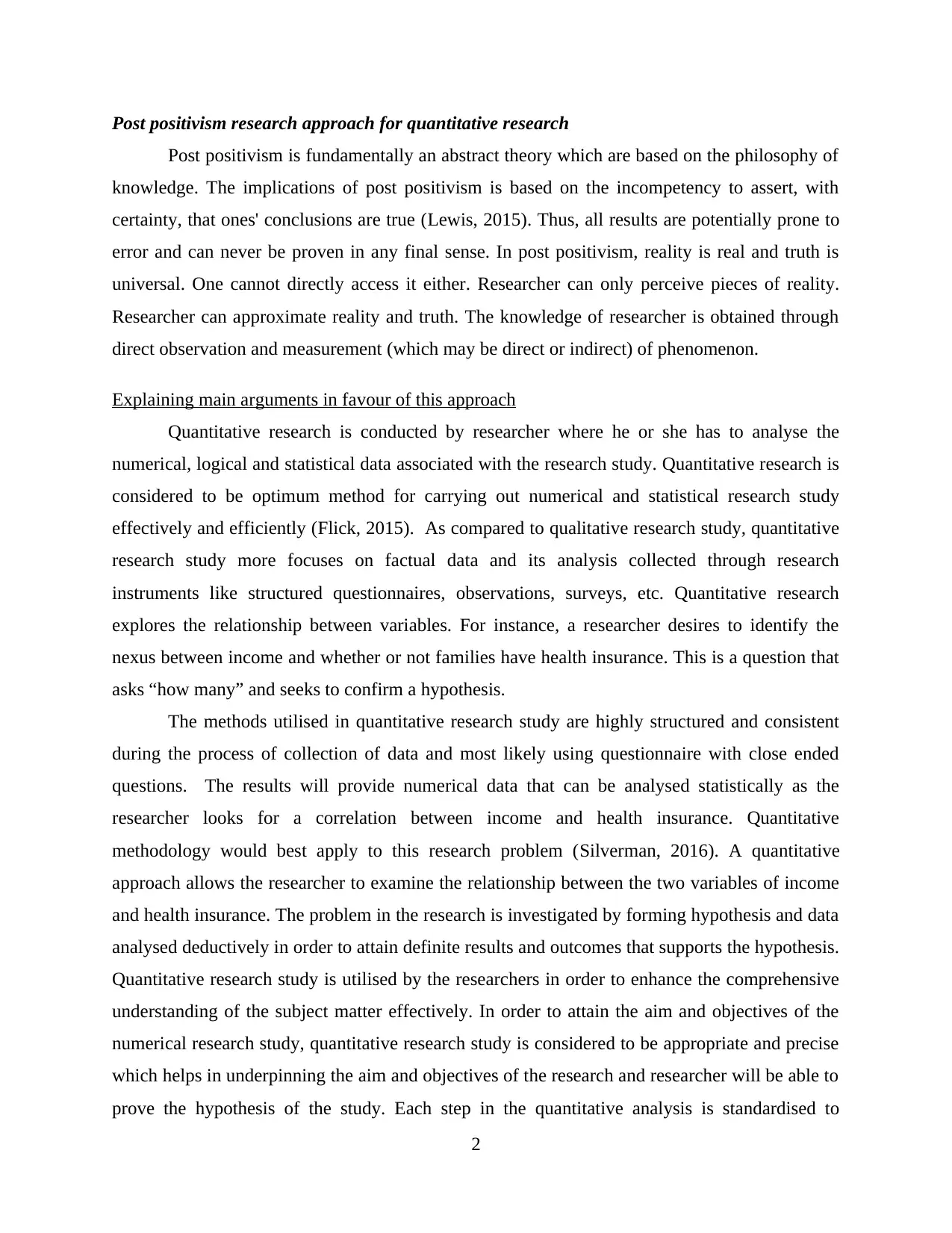
Post positivism research approach for quantitative research
Post positivism is fundamentally an abstract theory which are based on the philosophy of
knowledge. The implications of post positivism is based on the incompetency to assert, with
certainty, that ones' conclusions are true (Lewis, 2015). Thus, all results are potentially prone to
error and can never be proven in any final sense. In post positivism, reality is real and truth is
universal. One cannot directly access it either. Researcher can only perceive pieces of reality.
Researcher can approximate reality and truth. The knowledge of researcher is obtained through
direct observation and measurement (which may be direct or indirect) of phenomenon.
Explaining main arguments in favour of this approach
Quantitative research is conducted by researcher where he or she has to analyse the
numerical, logical and statistical data associated with the research study. Quantitative research is
considered to be optimum method for carrying out numerical and statistical research study
effectively and efficiently (Flick, 2015). As compared to qualitative research study, quantitative
research study more focuses on factual data and its analysis collected through research
instruments like structured questionnaires, observations, surveys, etc. Quantitative research
explores the relationship between variables. For instance, a researcher desires to identify the
nexus between income and whether or not families have health insurance. This is a question that
asks “how many” and seeks to confirm a hypothesis.
The methods utilised in quantitative research study are highly structured and consistent
during the process of collection of data and most likely using questionnaire with close ended
questions. The results will provide numerical data that can be analysed statistically as the
researcher looks for a correlation between income and health insurance. Quantitative
methodology would best apply to this research problem (Silverman, 2016). A quantitative
approach allows the researcher to examine the relationship between the two variables of income
and health insurance. The problem in the research is investigated by forming hypothesis and data
analysed deductively in order to attain definite results and outcomes that supports the hypothesis.
Quantitative research study is utilised by the researchers in order to enhance the comprehensive
understanding of the subject matter effectively. In order to attain the aim and objectives of the
numerical research study, quantitative research study is considered to be appropriate and precise
which helps in underpinning the aim and objectives of the research and researcher will be able to
prove the hypothesis of the study. Each step in the quantitative analysis is standardised to
2
Post positivism is fundamentally an abstract theory which are based on the philosophy of
knowledge. The implications of post positivism is based on the incompetency to assert, with
certainty, that ones' conclusions are true (Lewis, 2015). Thus, all results are potentially prone to
error and can never be proven in any final sense. In post positivism, reality is real and truth is
universal. One cannot directly access it either. Researcher can only perceive pieces of reality.
Researcher can approximate reality and truth. The knowledge of researcher is obtained through
direct observation and measurement (which may be direct or indirect) of phenomenon.
Explaining main arguments in favour of this approach
Quantitative research is conducted by researcher where he or she has to analyse the
numerical, logical and statistical data associated with the research study. Quantitative research is
considered to be optimum method for carrying out numerical and statistical research study
effectively and efficiently (Flick, 2015). As compared to qualitative research study, quantitative
research study more focuses on factual data and its analysis collected through research
instruments like structured questionnaires, observations, surveys, etc. Quantitative research
explores the relationship between variables. For instance, a researcher desires to identify the
nexus between income and whether or not families have health insurance. This is a question that
asks “how many” and seeks to confirm a hypothesis.
The methods utilised in quantitative research study are highly structured and consistent
during the process of collection of data and most likely using questionnaire with close ended
questions. The results will provide numerical data that can be analysed statistically as the
researcher looks for a correlation between income and health insurance. Quantitative
methodology would best apply to this research problem (Silverman, 2016). A quantitative
approach allows the researcher to examine the relationship between the two variables of income
and health insurance. The problem in the research is investigated by forming hypothesis and data
analysed deductively in order to attain definite results and outcomes that supports the hypothesis.
Quantitative research study is utilised by the researchers in order to enhance the comprehensive
understanding of the subject matter effectively. In order to attain the aim and objectives of the
numerical research study, quantitative research study is considered to be appropriate and precise
which helps in underpinning the aim and objectives of the research and researcher will be able to
prove the hypothesis of the study. Each step in the quantitative analysis is standardised to
2
Paraphrase This Document
Need a fresh take? Get an instant paraphrase of this document with our AI Paraphraser
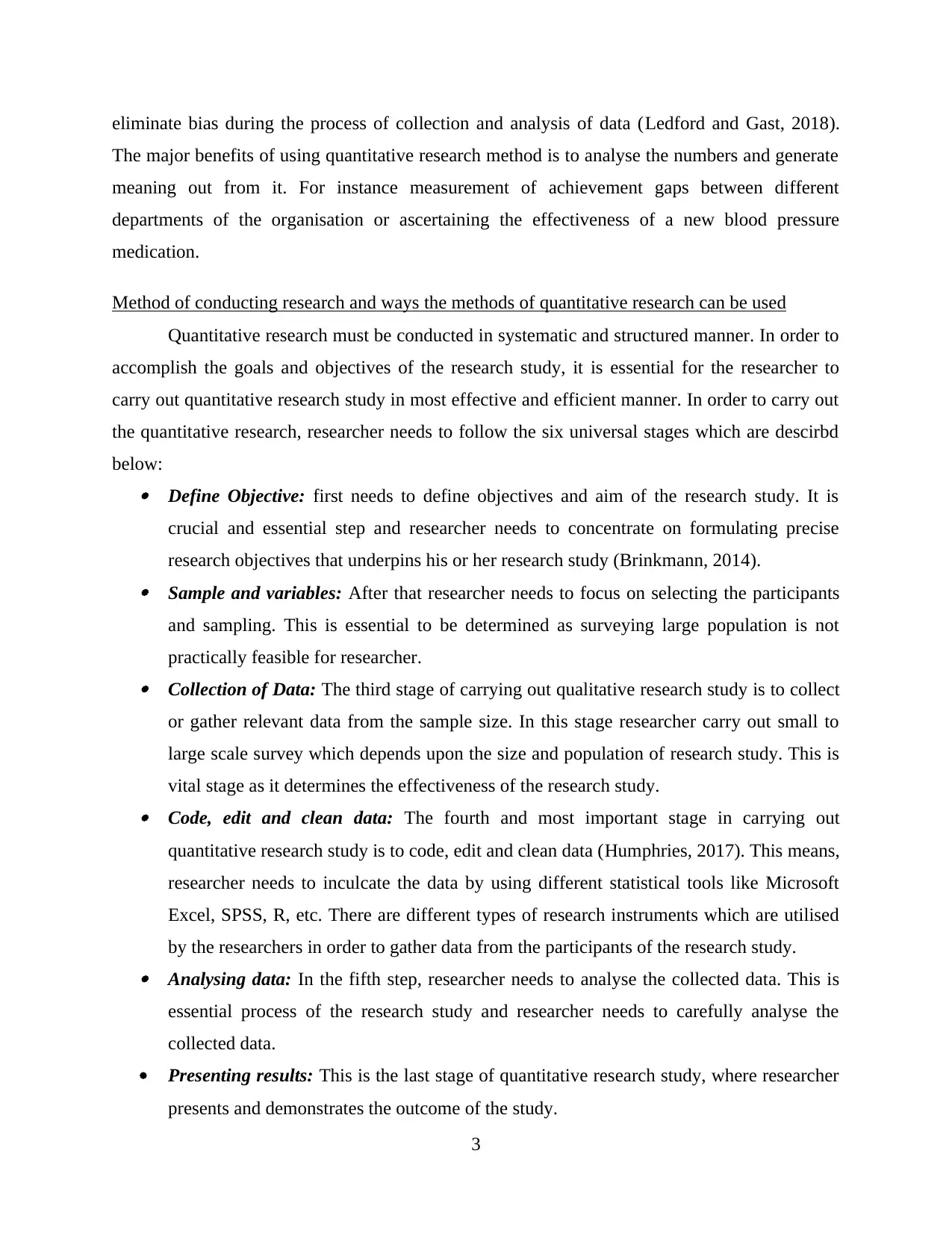
eliminate bias during the process of collection and analysis of data (Ledford and Gast, 2018).
The major benefits of using quantitative research method is to analyse the numbers and generate
meaning out from it. For instance measurement of achievement gaps between different
departments of the organisation or ascertaining the effectiveness of a new blood pressure
medication.
Method of conducting research and ways the methods of quantitative research can be used
Quantitative research must be conducted in systematic and structured manner. In order to
accomplish the goals and objectives of the research study, it is essential for the researcher to
carry out quantitative research study in most effective and efficient manner. In order to carry out
the quantitative research, researcher needs to follow the six universal stages which are descirbd
below: Define Objective: first needs to define objectives and aim of the research study. It is
crucial and essential step and researcher needs to concentrate on formulating precise
research objectives that underpins his or her research study (Brinkmann, 2014). Sample and variables: After that researcher needs to focus on selecting the participants
and sampling. This is essential to be determined as surveying large population is not
practically feasible for researcher. Collection of Data: The third stage of carrying out qualitative research study is to collect
or gather relevant data from the sample size. In this stage researcher carry out small to
large scale survey which depends upon the size and population of research study. This is
vital stage as it determines the effectiveness of the research study. Code, edit and clean data: The fourth and most important stage in carrying out
quantitative research study is to code, edit and clean data (Humphries, 2017). This means,
researcher needs to inculcate the data by using different statistical tools like Microsoft
Excel, SPSS, R, etc. There are different types of research instruments which are utilised
by the researchers in order to gather data from the participants of the research study. Analysing data: In the fifth step, researcher needs to analyse the collected data. This is
essential process of the research study and researcher needs to carefully analyse the
collected data.
Presenting results: This is the last stage of quantitative research study, where researcher
presents and demonstrates the outcome of the study.
3
The major benefits of using quantitative research method is to analyse the numbers and generate
meaning out from it. For instance measurement of achievement gaps between different
departments of the organisation or ascertaining the effectiveness of a new blood pressure
medication.
Method of conducting research and ways the methods of quantitative research can be used
Quantitative research must be conducted in systematic and structured manner. In order to
accomplish the goals and objectives of the research study, it is essential for the researcher to
carry out quantitative research study in most effective and efficient manner. In order to carry out
the quantitative research, researcher needs to follow the six universal stages which are descirbd
below: Define Objective: first needs to define objectives and aim of the research study. It is
crucial and essential step and researcher needs to concentrate on formulating precise
research objectives that underpins his or her research study (Brinkmann, 2014). Sample and variables: After that researcher needs to focus on selecting the participants
and sampling. This is essential to be determined as surveying large population is not
practically feasible for researcher. Collection of Data: The third stage of carrying out qualitative research study is to collect
or gather relevant data from the sample size. In this stage researcher carry out small to
large scale survey which depends upon the size and population of research study. This is
vital stage as it determines the effectiveness of the research study. Code, edit and clean data: The fourth and most important stage in carrying out
quantitative research study is to code, edit and clean data (Humphries, 2017). This means,
researcher needs to inculcate the data by using different statistical tools like Microsoft
Excel, SPSS, R, etc. There are different types of research instruments which are utilised
by the researchers in order to gather data from the participants of the research study. Analysing data: In the fifth step, researcher needs to analyse the collected data. This is
essential process of the research study and researcher needs to carefully analyse the
collected data.
Presenting results: This is the last stage of quantitative research study, where researcher
presents and demonstrates the outcome of the study.
3
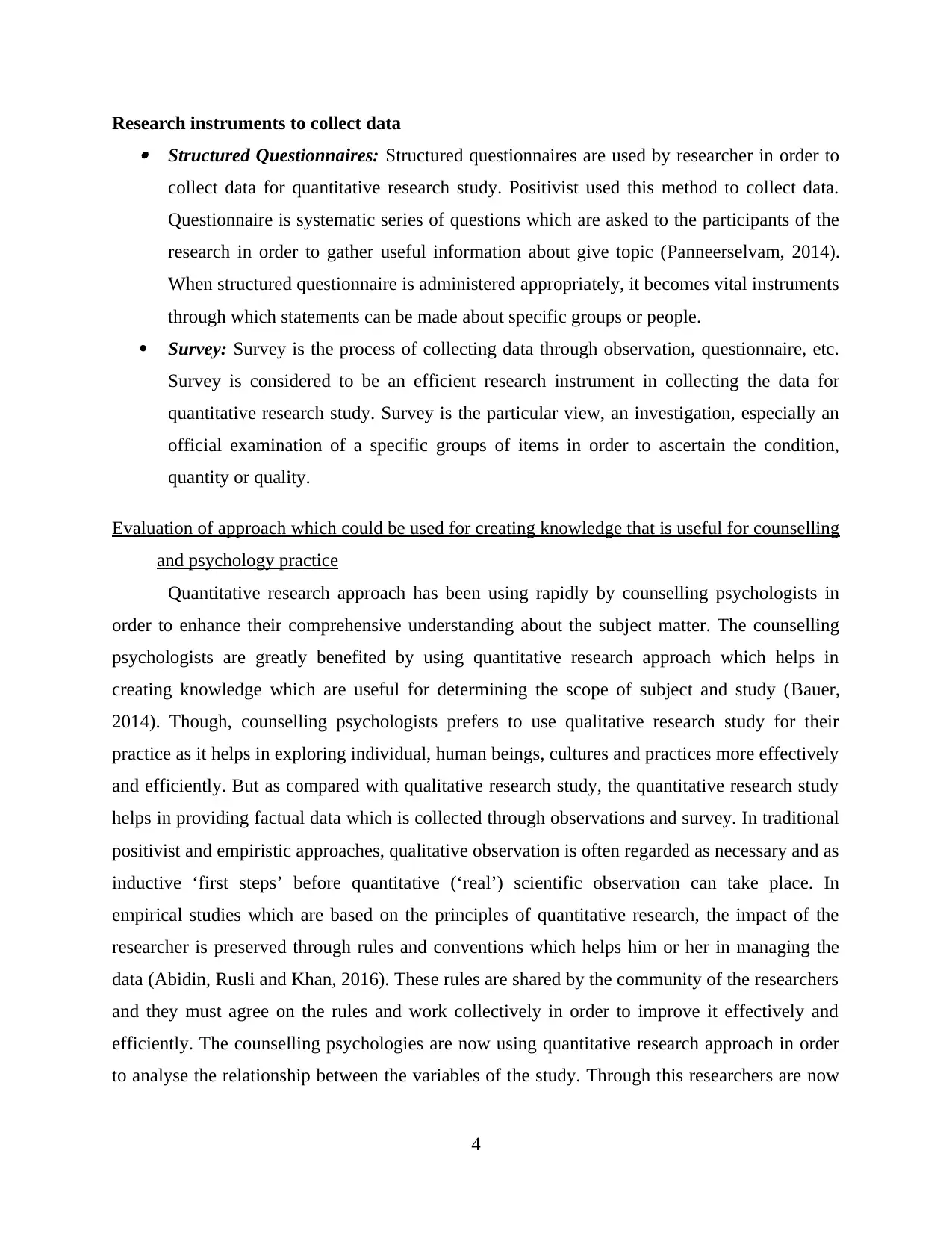
Research instruments to collect data Structured Questionnaires: Structured questionnaires are used by researcher in order to
collect data for quantitative research study. Positivist used this method to collect data.
Questionnaire is systematic series of questions which are asked to the participants of the
research in order to gather useful information about give topic (Panneerselvam, 2014).
When structured questionnaire is administered appropriately, it becomes vital instruments
through which statements can be made about specific groups or people.
Survey: Survey is the process of collecting data through observation, questionnaire, etc.
Survey is considered to be an efficient research instrument in collecting the data for
quantitative research study. Survey is the particular view, an investigation, especially an
official examination of a specific groups of items in order to ascertain the condition,
quantity or quality.
Evaluation of approach which could be used for creating knowledge that is useful for counselling
and psychology practice
Quantitative research approach has been using rapidly by counselling psychologists in
order to enhance their comprehensive understanding about the subject matter. The counselling
psychologists are greatly benefited by using quantitative research approach which helps in
creating knowledge which are useful for determining the scope of subject and study (Bauer,
2014). Though, counselling psychologists prefers to use qualitative research study for their
practice as it helps in exploring individual, human beings, cultures and practices more effectively
and efficiently. But as compared with qualitative research study, the quantitative research study
helps in providing factual data which is collected through observations and survey. In traditional
positivist and empiristic approaches, qualitative observation is often regarded as necessary and as
inductive ‘first steps’ before quantitative (‘real’) scientific observation can take place. In
empirical studies which are based on the principles of quantitative research, the impact of the
researcher is preserved through rules and conventions which helps him or her in managing the
data (Abidin, Rusli and Khan, 2016). These rules are shared by the community of the researchers
and they must agree on the rules and work collectively in order to improve it effectively and
efficiently. The counselling psychologies are now using quantitative research approach in order
to analyse the relationship between the variables of the study. Through this researchers are now
4
collect data for quantitative research study. Positivist used this method to collect data.
Questionnaire is systematic series of questions which are asked to the participants of the
research in order to gather useful information about give topic (Panneerselvam, 2014).
When structured questionnaire is administered appropriately, it becomes vital instruments
through which statements can be made about specific groups or people.
Survey: Survey is the process of collecting data through observation, questionnaire, etc.
Survey is considered to be an efficient research instrument in collecting the data for
quantitative research study. Survey is the particular view, an investigation, especially an
official examination of a specific groups of items in order to ascertain the condition,
quantity or quality.
Evaluation of approach which could be used for creating knowledge that is useful for counselling
and psychology practice
Quantitative research approach has been using rapidly by counselling psychologists in
order to enhance their comprehensive understanding about the subject matter. The counselling
psychologists are greatly benefited by using quantitative research approach which helps in
creating knowledge which are useful for determining the scope of subject and study (Bauer,
2014). Though, counselling psychologists prefers to use qualitative research study for their
practice as it helps in exploring individual, human beings, cultures and practices more effectively
and efficiently. But as compared with qualitative research study, the quantitative research study
helps in providing factual data which is collected through observations and survey. In traditional
positivist and empiristic approaches, qualitative observation is often regarded as necessary and as
inductive ‘first steps’ before quantitative (‘real’) scientific observation can take place. In
empirical studies which are based on the principles of quantitative research, the impact of the
researcher is preserved through rules and conventions which helps him or her in managing the
data (Abidin, Rusli and Khan, 2016). These rules are shared by the community of the researchers
and they must agree on the rules and work collectively in order to improve it effectively and
efficiently. The counselling psychologies are now using quantitative research approach in order
to analyse the relationship between the variables of the study. Through this researchers are now
4
⊘ This is a preview!⊘
Do you want full access?
Subscribe today to unlock all pages.

Trusted by 1+ million students worldwide
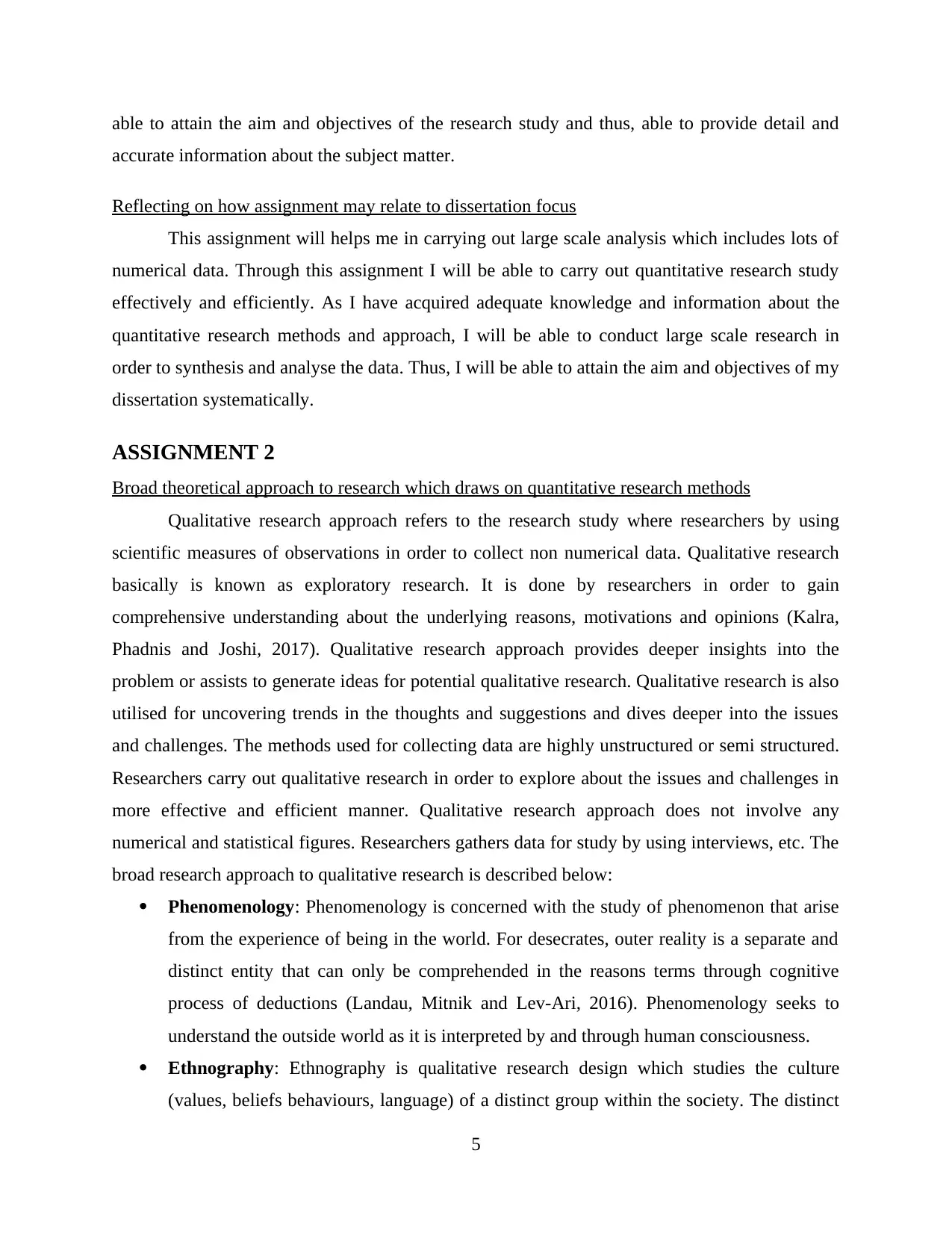
able to attain the aim and objectives of the research study and thus, able to provide detail and
accurate information about the subject matter.
Reflecting on how assignment may relate to dissertation focus
This assignment will helps me in carrying out large scale analysis which includes lots of
numerical data. Through this assignment I will be able to carry out quantitative research study
effectively and efficiently. As I have acquired adequate knowledge and information about the
quantitative research methods and approach, I will be able to conduct large scale research in
order to synthesis and analyse the data. Thus, I will be able to attain the aim and objectives of my
dissertation systematically.
ASSIGNMENT 2
Broad theoretical approach to research which draws on quantitative research methods
Qualitative research approach refers to the research study where researchers by using
scientific measures of observations in order to collect non numerical data. Qualitative research
basically is known as exploratory research. It is done by researchers in order to gain
comprehensive understanding about the underlying reasons, motivations and opinions (Kalra,
Phadnis and Joshi, 2017). Qualitative research approach provides deeper insights into the
problem or assists to generate ideas for potential qualitative research. Qualitative research is also
utilised for uncovering trends in the thoughts and suggestions and dives deeper into the issues
and challenges. The methods used for collecting data are highly unstructured or semi structured.
Researchers carry out qualitative research in order to explore about the issues and challenges in
more effective and efficient manner. Qualitative research approach does not involve any
numerical and statistical figures. Researchers gathers data for study by using interviews, etc. The
broad research approach to qualitative research is described below:
Phenomenology: Phenomenology is concerned with the study of phenomenon that arise
from the experience of being in the world. For desecrates, outer reality is a separate and
distinct entity that can only be comprehended in the reasons terms through cognitive
process of deductions (Landau, Mitnik and Lev-Ari, 2016). Phenomenology seeks to
understand the outside world as it is interpreted by and through human consciousness.
Ethnography: Ethnography is qualitative research design which studies the culture
(values, beliefs behaviours, language) of a distinct group within the society. The distinct
5
accurate information about the subject matter.
Reflecting on how assignment may relate to dissertation focus
This assignment will helps me in carrying out large scale analysis which includes lots of
numerical data. Through this assignment I will be able to carry out quantitative research study
effectively and efficiently. As I have acquired adequate knowledge and information about the
quantitative research methods and approach, I will be able to conduct large scale research in
order to synthesis and analyse the data. Thus, I will be able to attain the aim and objectives of my
dissertation systematically.
ASSIGNMENT 2
Broad theoretical approach to research which draws on quantitative research methods
Qualitative research approach refers to the research study where researchers by using
scientific measures of observations in order to collect non numerical data. Qualitative research
basically is known as exploratory research. It is done by researchers in order to gain
comprehensive understanding about the underlying reasons, motivations and opinions (Kalra,
Phadnis and Joshi, 2017). Qualitative research approach provides deeper insights into the
problem or assists to generate ideas for potential qualitative research. Qualitative research is also
utilised for uncovering trends in the thoughts and suggestions and dives deeper into the issues
and challenges. The methods used for collecting data are highly unstructured or semi structured.
Researchers carry out qualitative research in order to explore about the issues and challenges in
more effective and efficient manner. Qualitative research approach does not involve any
numerical and statistical figures. Researchers gathers data for study by using interviews, etc. The
broad research approach to qualitative research is described below:
Phenomenology: Phenomenology is concerned with the study of phenomenon that arise
from the experience of being in the world. For desecrates, outer reality is a separate and
distinct entity that can only be comprehended in the reasons terms through cognitive
process of deductions (Landau, Mitnik and Lev-Ari, 2016). Phenomenology seeks to
understand the outside world as it is interpreted by and through human consciousness.
Ethnography: Ethnography is qualitative research design which studies the culture
(values, beliefs behaviours, language) of a distinct group within the society. The distinct
5
Paraphrase This Document
Need a fresh take? Get an instant paraphrase of this document with our AI Paraphraser
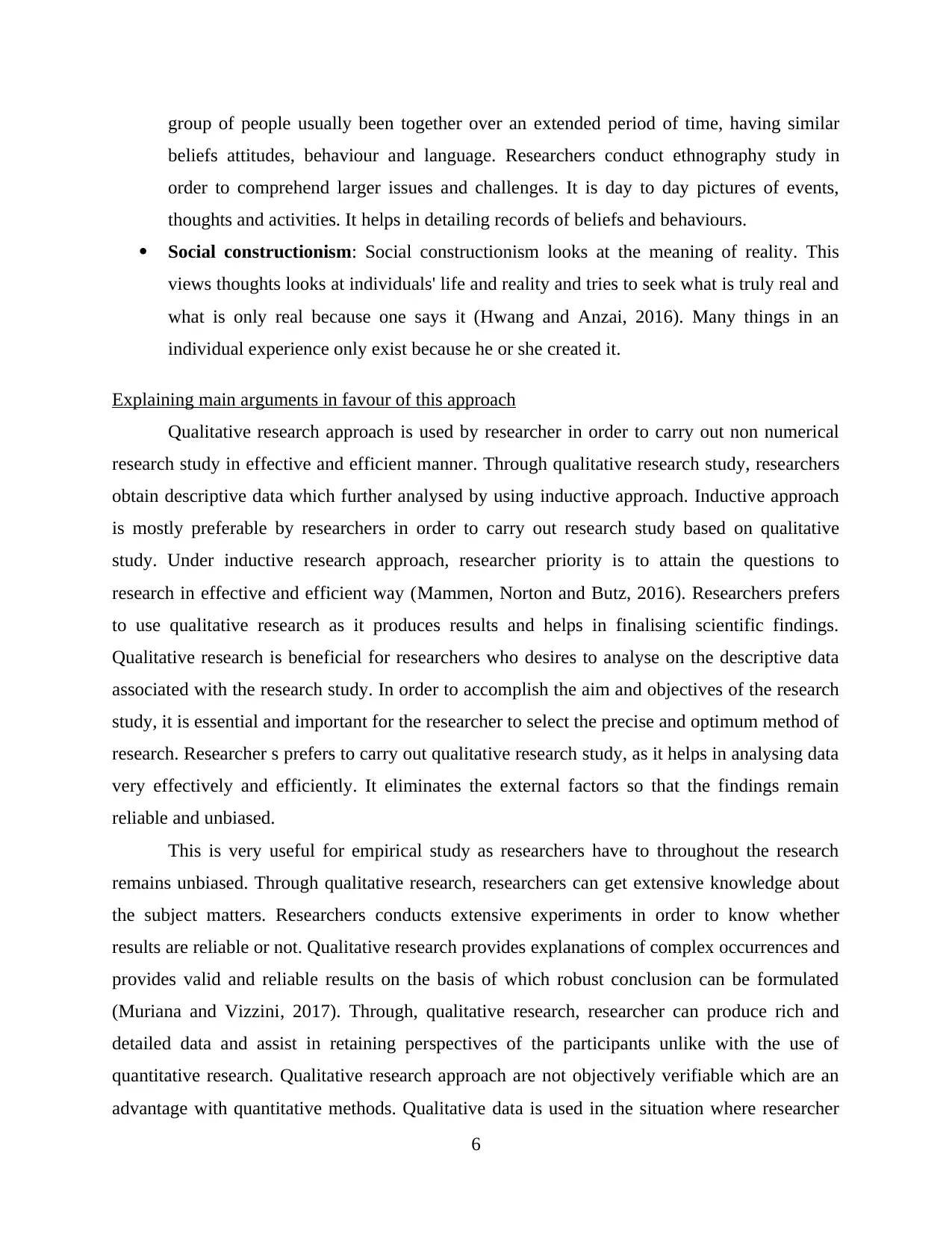
group of people usually been together over an extended period of time, having similar
beliefs attitudes, behaviour and language. Researchers conduct ethnography study in
order to comprehend larger issues and challenges. It is day to day pictures of events,
thoughts and activities. It helps in detailing records of beliefs and behaviours.
Social constructionism: Social constructionism looks at the meaning of reality. This
views thoughts looks at individuals' life and reality and tries to seek what is truly real and
what is only real because one says it (Hwang and Anzai, 2016). Many things in an
individual experience only exist because he or she created it.
Explaining main arguments in favour of this approach
Qualitative research approach is used by researcher in order to carry out non numerical
research study in effective and efficient manner. Through qualitative research study, researchers
obtain descriptive data which further analysed by using inductive approach. Inductive approach
is mostly preferable by researchers in order to carry out research study based on qualitative
study. Under inductive research approach, researcher priority is to attain the questions to
research in effective and efficient way (Mammen, Norton and Butz, 2016). Researchers prefers
to use qualitative research as it produces results and helps in finalising scientific findings.
Qualitative research is beneficial for researchers who desires to analyse on the descriptive data
associated with the research study. In order to accomplish the aim and objectives of the research
study, it is essential and important for the researcher to select the precise and optimum method of
research. Researcher s prefers to carry out qualitative research study, as it helps in analysing data
very effectively and efficiently. It eliminates the external factors so that the findings remain
reliable and unbiased.
This is very useful for empirical study as researchers have to throughout the research
remains unbiased. Through qualitative research, researchers can get extensive knowledge about
the subject matters. Researchers conducts extensive experiments in order to know whether
results are reliable or not. Qualitative research provides explanations of complex occurrences and
provides valid and reliable results on the basis of which robust conclusion can be formulated
(Muriana and Vizzini, 2017). Through, qualitative research, researcher can produce rich and
detailed data and assist in retaining perspectives of the participants unlike with the use of
quantitative research. Qualitative research approach are not objectively verifiable which are an
advantage with quantitative methods. Qualitative data is used in the situation where researcher
6
beliefs attitudes, behaviour and language. Researchers conduct ethnography study in
order to comprehend larger issues and challenges. It is day to day pictures of events,
thoughts and activities. It helps in detailing records of beliefs and behaviours.
Social constructionism: Social constructionism looks at the meaning of reality. This
views thoughts looks at individuals' life and reality and tries to seek what is truly real and
what is only real because one says it (Hwang and Anzai, 2016). Many things in an
individual experience only exist because he or she created it.
Explaining main arguments in favour of this approach
Qualitative research approach is used by researcher in order to carry out non numerical
research study in effective and efficient manner. Through qualitative research study, researchers
obtain descriptive data which further analysed by using inductive approach. Inductive approach
is mostly preferable by researchers in order to carry out research study based on qualitative
study. Under inductive research approach, researcher priority is to attain the questions to
research in effective and efficient way (Mammen, Norton and Butz, 2016). Researchers prefers
to use qualitative research as it produces results and helps in finalising scientific findings.
Qualitative research is beneficial for researchers who desires to analyse on the descriptive data
associated with the research study. In order to accomplish the aim and objectives of the research
study, it is essential and important for the researcher to select the precise and optimum method of
research. Researcher s prefers to carry out qualitative research study, as it helps in analysing data
very effectively and efficiently. It eliminates the external factors so that the findings remain
reliable and unbiased.
This is very useful for empirical study as researchers have to throughout the research
remains unbiased. Through qualitative research, researchers can get extensive knowledge about
the subject matters. Researchers conducts extensive experiments in order to know whether
results are reliable or not. Qualitative research provides explanations of complex occurrences and
provides valid and reliable results on the basis of which robust conclusion can be formulated
(Muriana and Vizzini, 2017). Through, qualitative research, researcher can produce rich and
detailed data and assist in retaining perspectives of the participants unlike with the use of
quantitative research. Qualitative research approach are not objectively verifiable which are an
advantage with quantitative methods. Qualitative data is used in the situation where researcher
6
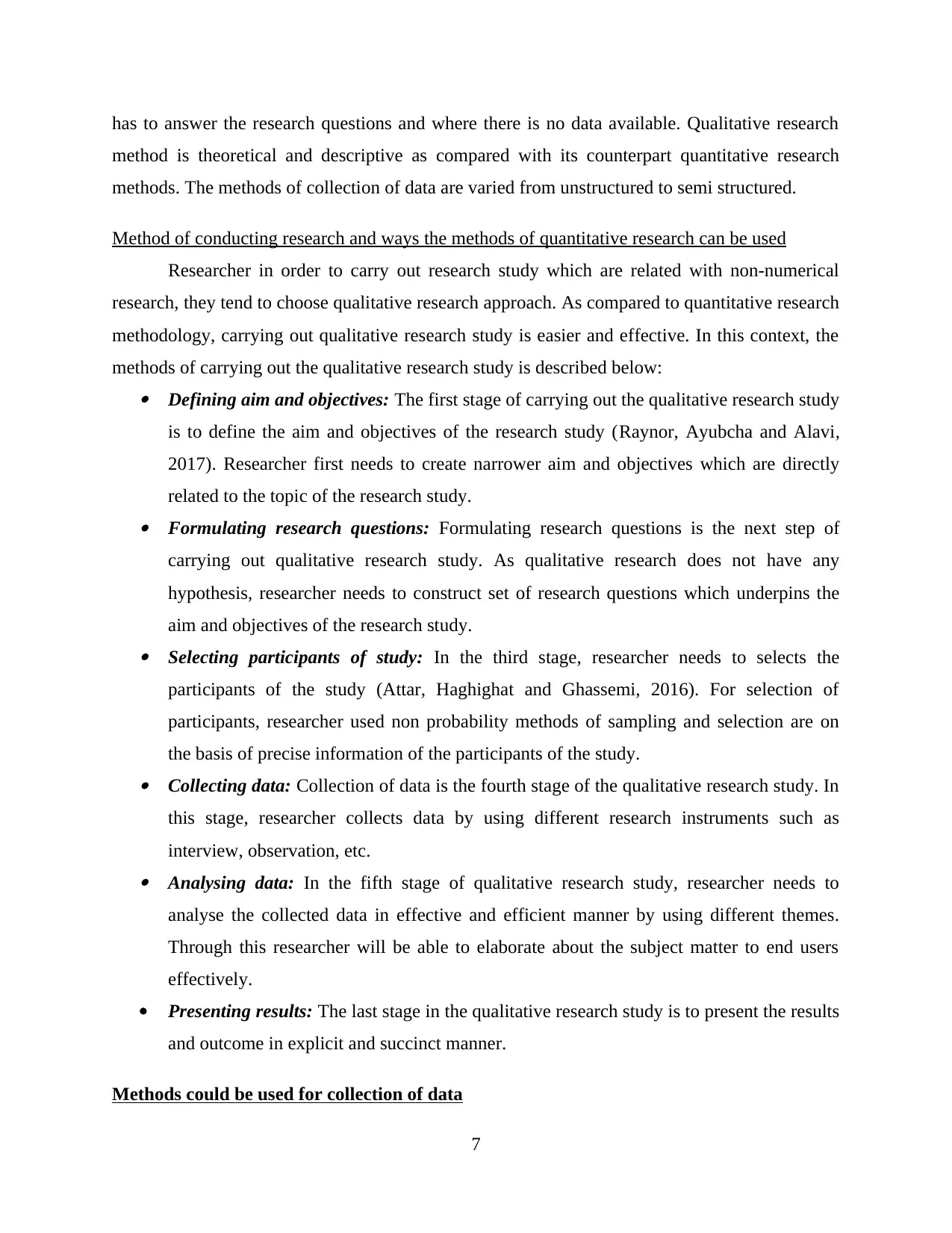
has to answer the research questions and where there is no data available. Qualitative research
method is theoretical and descriptive as compared with its counterpart quantitative research
methods. The methods of collection of data are varied from unstructured to semi structured.
Method of conducting research and ways the methods of quantitative research can be used
Researcher in order to carry out research study which are related with non-numerical
research, they tend to choose qualitative research approach. As compared to quantitative research
methodology, carrying out qualitative research study is easier and effective. In this context, the
methods of carrying out the qualitative research study is described below: Defining aim and objectives: The first stage of carrying out the qualitative research study
is to define the aim and objectives of the research study (Raynor, Ayubcha and Alavi,
2017). Researcher first needs to create narrower aim and objectives which are directly
related to the topic of the research study. Formulating research questions: Formulating research questions is the next step of
carrying out qualitative research study. As qualitative research does not have any
hypothesis, researcher needs to construct set of research questions which underpins the
aim and objectives of the research study. Selecting participants of study: In the third stage, researcher needs to selects the
participants of the study (Attar, Haghighat and Ghassemi, 2016). For selection of
participants, researcher used non probability methods of sampling and selection are on
the basis of precise information of the participants of the study. Collecting data: Collection of data is the fourth stage of the qualitative research study. In
this stage, researcher collects data by using different research instruments such as
interview, observation, etc. Analysing data: In the fifth stage of qualitative research study, researcher needs to
analyse the collected data in effective and efficient manner by using different themes.
Through this researcher will be able to elaborate about the subject matter to end users
effectively.
Presenting results: The last stage in the qualitative research study is to present the results
and outcome in explicit and succinct manner.
Methods could be used for collection of data
7
method is theoretical and descriptive as compared with its counterpart quantitative research
methods. The methods of collection of data are varied from unstructured to semi structured.
Method of conducting research and ways the methods of quantitative research can be used
Researcher in order to carry out research study which are related with non-numerical
research, they tend to choose qualitative research approach. As compared to quantitative research
methodology, carrying out qualitative research study is easier and effective. In this context, the
methods of carrying out the qualitative research study is described below: Defining aim and objectives: The first stage of carrying out the qualitative research study
is to define the aim and objectives of the research study (Raynor, Ayubcha and Alavi,
2017). Researcher first needs to create narrower aim and objectives which are directly
related to the topic of the research study. Formulating research questions: Formulating research questions is the next step of
carrying out qualitative research study. As qualitative research does not have any
hypothesis, researcher needs to construct set of research questions which underpins the
aim and objectives of the research study. Selecting participants of study: In the third stage, researcher needs to selects the
participants of the study (Attar, Haghighat and Ghassemi, 2016). For selection of
participants, researcher used non probability methods of sampling and selection are on
the basis of precise information of the participants of the study. Collecting data: Collection of data is the fourth stage of the qualitative research study. In
this stage, researcher collects data by using different research instruments such as
interview, observation, etc. Analysing data: In the fifth stage of qualitative research study, researcher needs to
analyse the collected data in effective and efficient manner by using different themes.
Through this researcher will be able to elaborate about the subject matter to end users
effectively.
Presenting results: The last stage in the qualitative research study is to present the results
and outcome in explicit and succinct manner.
Methods could be used for collection of data
7
⊘ This is a preview!⊘
Do you want full access?
Subscribe today to unlock all pages.

Trusted by 1+ million students worldwide
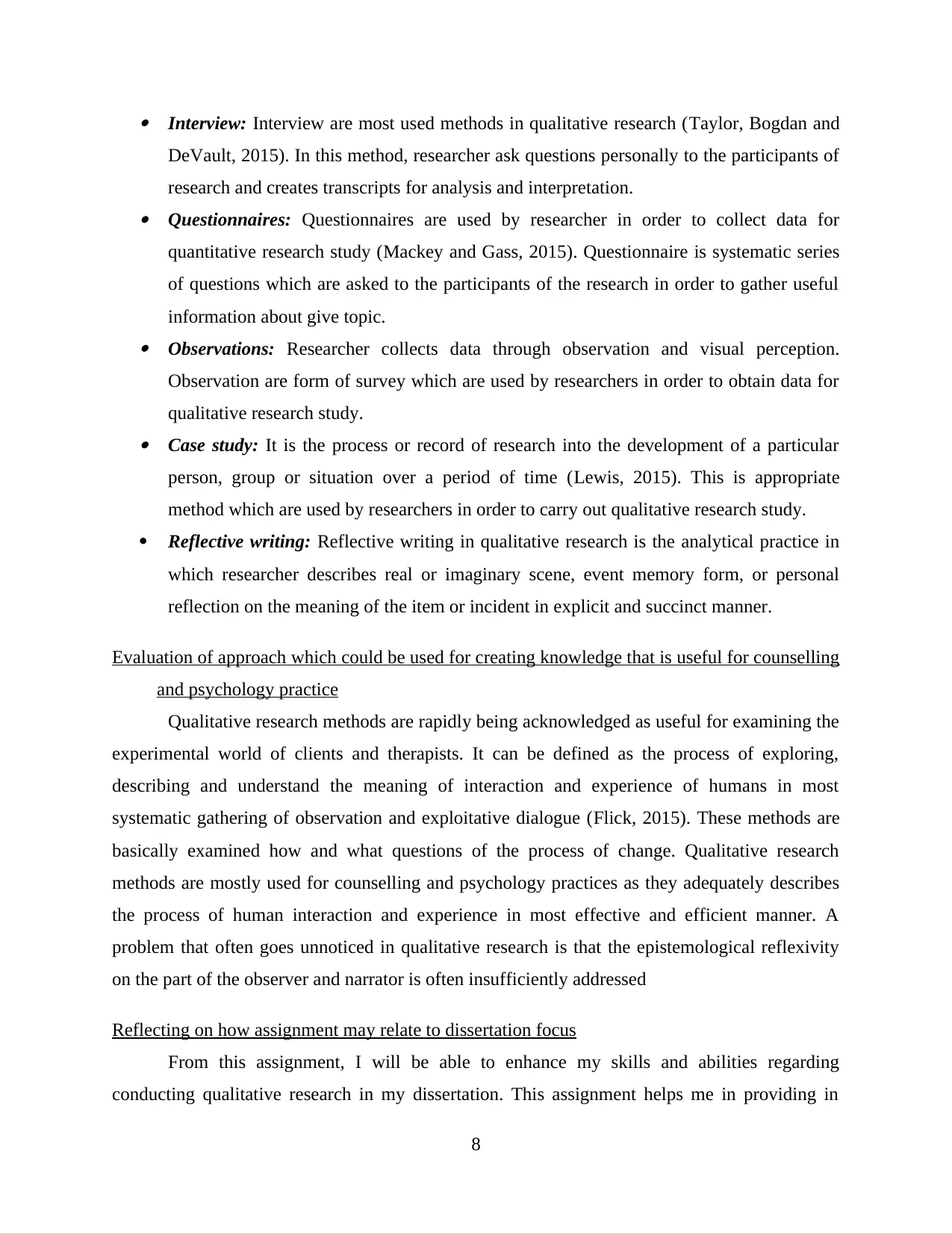
Interview: Interview are most used methods in qualitative research (Taylor, Bogdan and
DeVault, 2015). In this method, researcher ask questions personally to the participants of
research and creates transcripts for analysis and interpretation. Questionnaires: Questionnaires are used by researcher in order to collect data for
quantitative research study (Mackey and Gass, 2015). Questionnaire is systematic series
of questions which are asked to the participants of the research in order to gather useful
information about give topic. Observations: Researcher collects data through observation and visual perception.
Observation are form of survey which are used by researchers in order to obtain data for
qualitative research study. Case study: It is the process or record of research into the development of a particular
person, group or situation over a period of time (Lewis, 2015). This is appropriate
method which are used by researchers in order to carry out qualitative research study.
Reflective writing: Reflective writing in qualitative research is the analytical practice in
which researcher describes real or imaginary scene, event memory form, or personal
reflection on the meaning of the item or incident in explicit and succinct manner.
Evaluation of approach which could be used for creating knowledge that is useful for counselling
and psychology practice
Qualitative research methods are rapidly being acknowledged as useful for examining the
experimental world of clients and therapists. It can be defined as the process of exploring,
describing and understand the meaning of interaction and experience of humans in most
systematic gathering of observation and exploitative dialogue (Flick, 2015). These methods are
basically examined how and what questions of the process of change. Qualitative research
methods are mostly used for counselling and psychology practices as they adequately describes
the process of human interaction and experience in most effective and efficient manner. A
problem that often goes unnoticed in qualitative research is that the epistemological reflexivity
on the part of the observer and narrator is often insufficiently addressed
Reflecting on how assignment may relate to dissertation focus
From this assignment, I will be able to enhance my skills and abilities regarding
conducting qualitative research in my dissertation. This assignment helps me in providing in
8
DeVault, 2015). In this method, researcher ask questions personally to the participants of
research and creates transcripts for analysis and interpretation. Questionnaires: Questionnaires are used by researcher in order to collect data for
quantitative research study (Mackey and Gass, 2015). Questionnaire is systematic series
of questions which are asked to the participants of the research in order to gather useful
information about give topic. Observations: Researcher collects data through observation and visual perception.
Observation are form of survey which are used by researchers in order to obtain data for
qualitative research study. Case study: It is the process or record of research into the development of a particular
person, group or situation over a period of time (Lewis, 2015). This is appropriate
method which are used by researchers in order to carry out qualitative research study.
Reflective writing: Reflective writing in qualitative research is the analytical practice in
which researcher describes real or imaginary scene, event memory form, or personal
reflection on the meaning of the item or incident in explicit and succinct manner.
Evaluation of approach which could be used for creating knowledge that is useful for counselling
and psychology practice
Qualitative research methods are rapidly being acknowledged as useful for examining the
experimental world of clients and therapists. It can be defined as the process of exploring,
describing and understand the meaning of interaction and experience of humans in most
systematic gathering of observation and exploitative dialogue (Flick, 2015). These methods are
basically examined how and what questions of the process of change. Qualitative research
methods are mostly used for counselling and psychology practices as they adequately describes
the process of human interaction and experience in most effective and efficient manner. A
problem that often goes unnoticed in qualitative research is that the epistemological reflexivity
on the part of the observer and narrator is often insufficiently addressed
Reflecting on how assignment may relate to dissertation focus
From this assignment, I will be able to enhance my skills and abilities regarding
conducting qualitative research in my dissertation. This assignment helps me in providing in
8
Paraphrase This Document
Need a fresh take? Get an instant paraphrase of this document with our AI Paraphraser
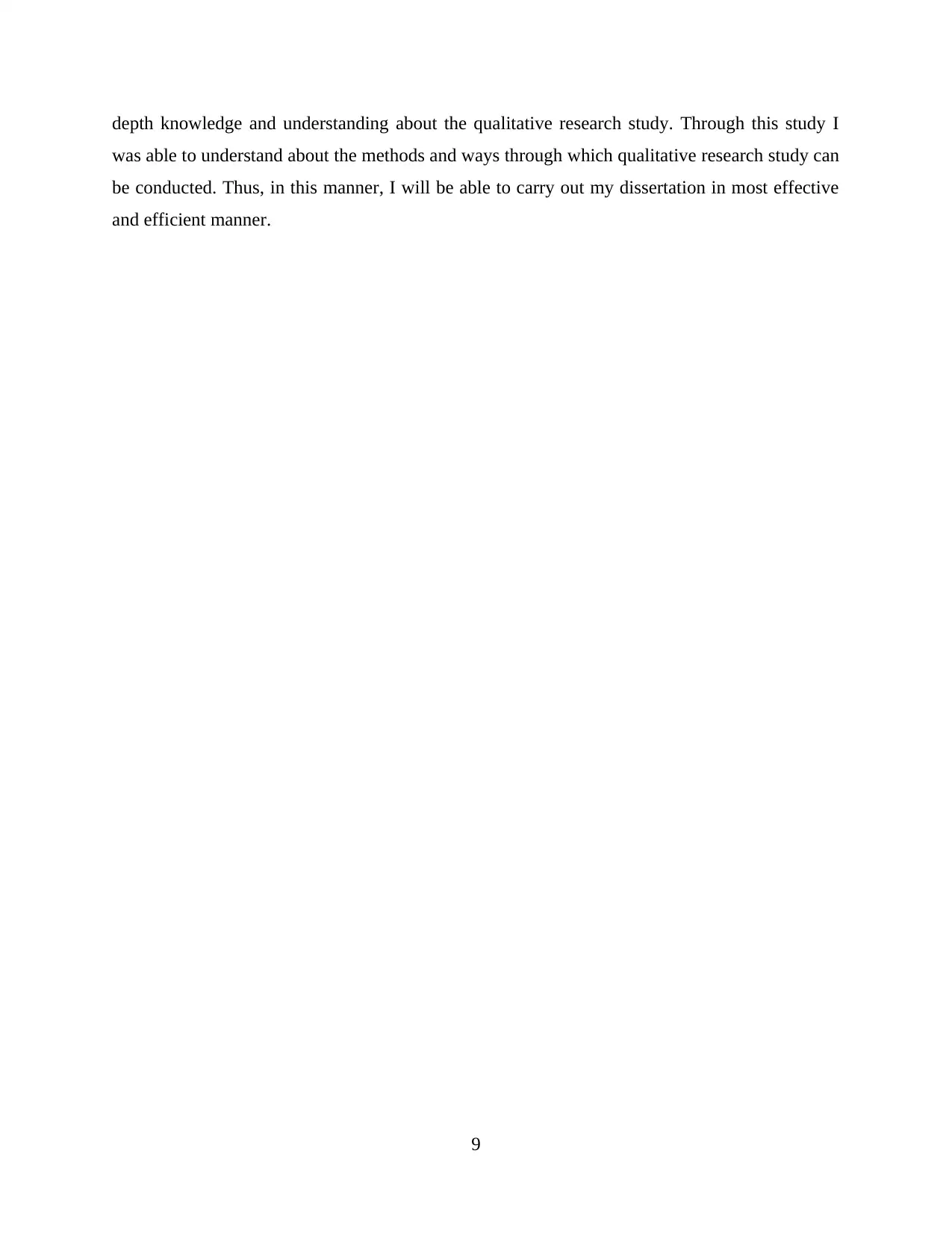
depth knowledge and understanding about the qualitative research study. Through this study I
was able to understand about the methods and ways through which qualitative research study can
be conducted. Thus, in this manner, I will be able to carry out my dissertation in most effective
and efficient manner.
9
was able to understand about the methods and ways through which qualitative research study can
be conducted. Thus, in this manner, I will be able to carry out my dissertation in most effective
and efficient manner.
9
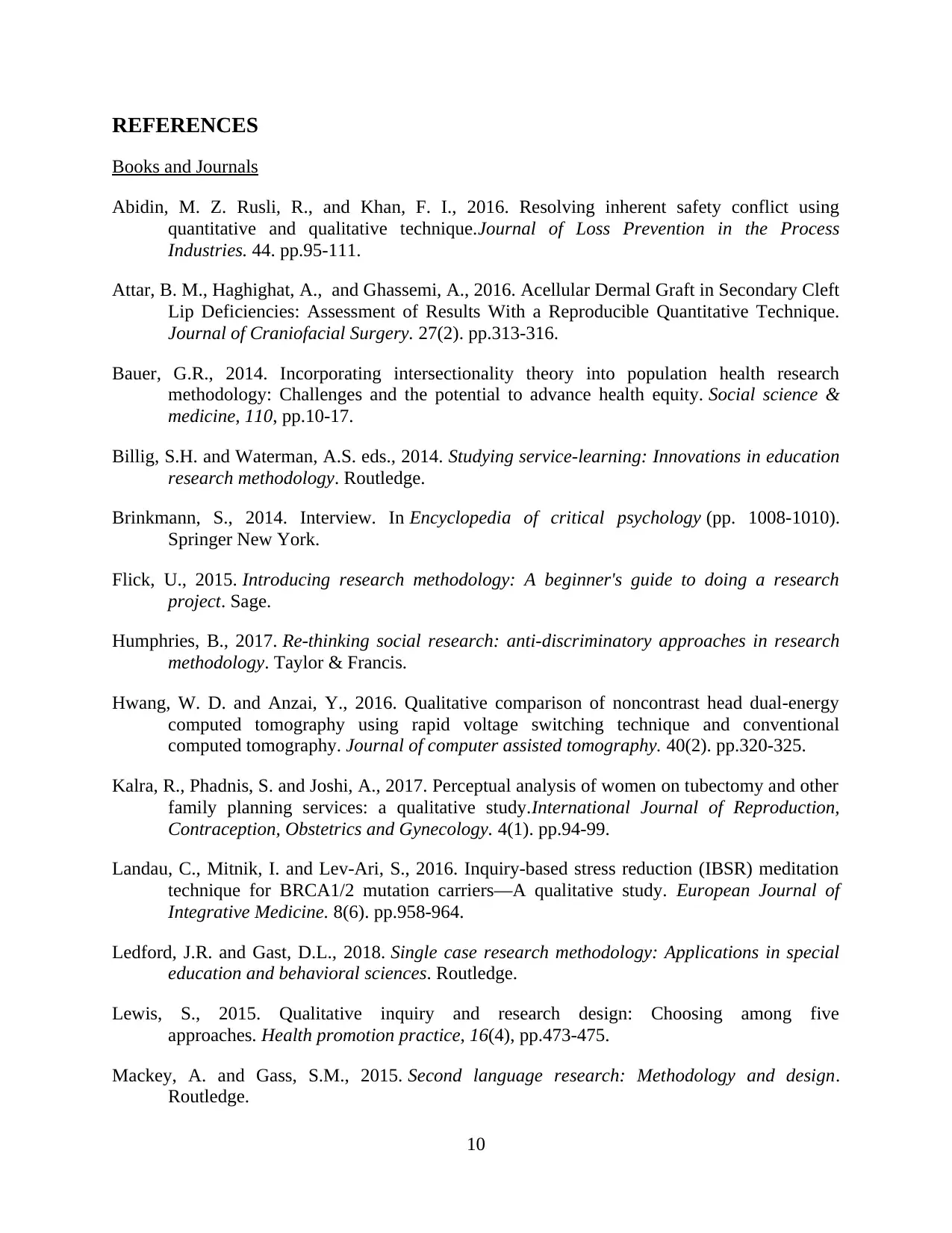
REFERENCES
Books and Journals
Abidin, M. Z. Rusli, R., and Khan, F. I., 2016. Resolving inherent safety conflict using
quantitative and qualitative technique.Journal of Loss Prevention in the Process
Industries. 44. pp.95-111.
Attar, B. M., Haghighat, A., and Ghassemi, A., 2016. Acellular Dermal Graft in Secondary Cleft
Lip Deficiencies: Assessment of Results With a Reproducible Quantitative Technique.
Journal of Craniofacial Surgery. 27(2). pp.313-316.
Bauer, G.R., 2014. Incorporating intersectionality theory into population health research
methodology: Challenges and the potential to advance health equity. Social science &
medicine, 110, pp.10-17.
Billig, S.H. and Waterman, A.S. eds., 2014. Studying service-learning: Innovations in education
research methodology. Routledge.
Brinkmann, S., 2014. Interview. In Encyclopedia of critical psychology (pp. 1008-1010).
Springer New York.
Flick, U., 2015. Introducing research methodology: A beginner's guide to doing a research
project. Sage.
Humphries, B., 2017. Re-thinking social research: anti-discriminatory approaches in research
methodology. Taylor & Francis.
Hwang, W. D. and Anzai, Y., 2016. Qualitative comparison of noncontrast head dual-energy
computed tomography using rapid voltage switching technique and conventional
computed tomography. Journal of computer assisted tomography. 40(2). pp.320-325.
Kalra, R., Phadnis, S. and Joshi, A., 2017. Perceptual analysis of women on tubectomy and other
family planning services: a qualitative study.International Journal of Reproduction,
Contraception, Obstetrics and Gynecology. 4(1). pp.94-99.
Landau, C., Mitnik, I. and Lev-Ari, S., 2016. Inquiry-based stress reduction (IBSR) meditation
technique for BRCA1/2 mutation carriers—A qualitative study. European Journal of
Integrative Medicine. 8(6). pp.958-964.
Ledford, J.R. and Gast, D.L., 2018. Single case research methodology: Applications in special
education and behavioral sciences. Routledge.
Lewis, S., 2015. Qualitative inquiry and research design: Choosing among five
approaches. Health promotion practice, 16(4), pp.473-475.
Mackey, A. and Gass, S.M., 2015. Second language research: Methodology and design.
Routledge.
10
Books and Journals
Abidin, M. Z. Rusli, R., and Khan, F. I., 2016. Resolving inherent safety conflict using
quantitative and qualitative technique.Journal of Loss Prevention in the Process
Industries. 44. pp.95-111.
Attar, B. M., Haghighat, A., and Ghassemi, A., 2016. Acellular Dermal Graft in Secondary Cleft
Lip Deficiencies: Assessment of Results With a Reproducible Quantitative Technique.
Journal of Craniofacial Surgery. 27(2). pp.313-316.
Bauer, G.R., 2014. Incorporating intersectionality theory into population health research
methodology: Challenges and the potential to advance health equity. Social science &
medicine, 110, pp.10-17.
Billig, S.H. and Waterman, A.S. eds., 2014. Studying service-learning: Innovations in education
research methodology. Routledge.
Brinkmann, S., 2014. Interview. In Encyclopedia of critical psychology (pp. 1008-1010).
Springer New York.
Flick, U., 2015. Introducing research methodology: A beginner's guide to doing a research
project. Sage.
Humphries, B., 2017. Re-thinking social research: anti-discriminatory approaches in research
methodology. Taylor & Francis.
Hwang, W. D. and Anzai, Y., 2016. Qualitative comparison of noncontrast head dual-energy
computed tomography using rapid voltage switching technique and conventional
computed tomography. Journal of computer assisted tomography. 40(2). pp.320-325.
Kalra, R., Phadnis, S. and Joshi, A., 2017. Perceptual analysis of women on tubectomy and other
family planning services: a qualitative study.International Journal of Reproduction,
Contraception, Obstetrics and Gynecology. 4(1). pp.94-99.
Landau, C., Mitnik, I. and Lev-Ari, S., 2016. Inquiry-based stress reduction (IBSR) meditation
technique for BRCA1/2 mutation carriers—A qualitative study. European Journal of
Integrative Medicine. 8(6). pp.958-964.
Ledford, J.R. and Gast, D.L., 2018. Single case research methodology: Applications in special
education and behavioral sciences. Routledge.
Lewis, S., 2015. Qualitative inquiry and research design: Choosing among five
approaches. Health promotion practice, 16(4), pp.473-475.
Mackey, A. and Gass, S.M., 2015. Second language research: Methodology and design.
Routledge.
10
⊘ This is a preview!⊘
Do you want full access?
Subscribe today to unlock all pages.

Trusted by 1+ million students worldwide
1 out of 13
Related Documents
Your All-in-One AI-Powered Toolkit for Academic Success.
+13062052269
info@desklib.com
Available 24*7 on WhatsApp / Email
![[object Object]](/_next/static/media/star-bottom.7253800d.svg)
Unlock your academic potential
Copyright © 2020–2026 A2Z Services. All Rights Reserved. Developed and managed by ZUCOL.





